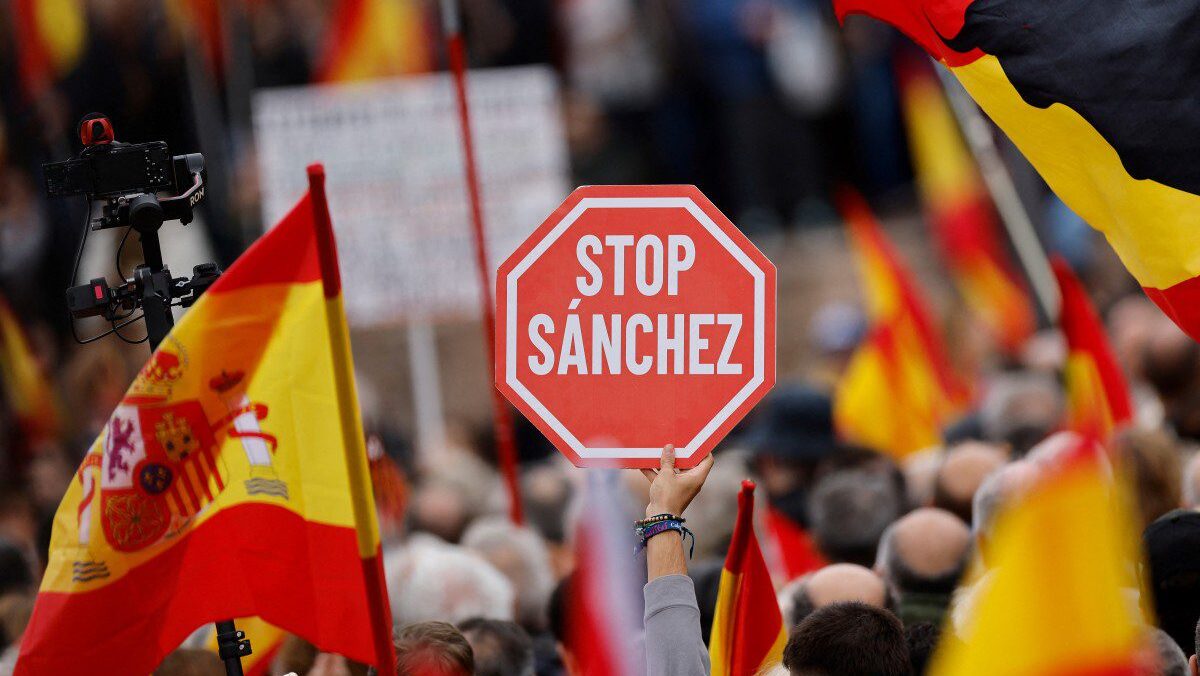
A protester holds a sign reading “Stop Sanchez” during a demonstration against plans to grant amnesty to Catalan separatists, in Madrid on October 29, 2023.
Photo: OSCAR DEL POZO / AFP
Not even the threat of rain could dampen the outrage Spanish protests expressed peacefully on Sunday.
In the largest demonstration yet against a reiteration of a socialist-communist coalition government granting concessions to Catalan and Basque separatists, some 200,000 Spaniards concentrated in Madrid’s Plaza de Colón. The crowd was so large it spread out for blocks on all sides of the plaza in the heart of the country’s capital.
Demonstrators waved Spanish flags and shouted “Puigdemont, to prison!” expressing their rejection of the amnesty that the acting prime minister, Pedro Sánchez, plans to grant to the organizers of the 2017 illegal referendum on secession of Catalonia from the Spanish nation. The concession would be in exchange for the votes of MEP Carles Puigdemont’s party, Junts per Cat, so that Sánchez, leader of the socialist party, can reform his government in coalition with the neo-communist party Sumar. Tight election results in July have made the Catalans key to any party forming a government.
Sánchez has been in negotiations with the Catalans for weeks. The demands of Puigdemont and the members of his party in Spain’s Congress of Deputies are clear: an amnesty for separatist leaders and the chance to hold another referendum on Catalan independence. Sánchez was cagey on exactly what he is willing to concede, until a few days ago,
“Catalonia is ready. In defense of coexistence and in the interest of Spain, today I defend amnesty in Catalonia,” he finally stated publicly during a meeting of his party at their headquarters.
Rather than calming the separatist spirit, an amnesty for secessionist leaders would only embolden them, opponents fear. Puigdemont and those involved in the 2017 referendum have made it clear their goal is to hold another referendum.
But Puigdemont’s party is not the only nationalist-separatist party that Sánchez has to placate. He also needs the support of the left-wing Catalan party, the more conservative Basque nationalist party, and EH Bildu, the political arm of the now-defunct Basque terrorist organization ETA. To gain these votes, Spanish media reports, Sánchez is promising some form of recognition of the Basque and Catalan regions as nations within Spain, a concession to the language of a “plurinational” Spain used by nationalist-separatists.
Protesters made it clear that other concessions to separatists are no more acceptable than an amnesty.
“When you shake hands with terrorists in Congress, they are killing the victims a second time. I do not forgive him for that,” one protester told El Debate in reference to Sánchez’s political alliance with EH Bildu.
“Never have so few done so much damage to the Spanish,” could also be read on a sign held up by protesters.
This was one of four recent protests against Sánchez, each larger than the one before it.
Spain’s moment of truth is just over a week away, as the official debate and vote in Congress on Sánchez’ proposed government is scheduled for November 8.
